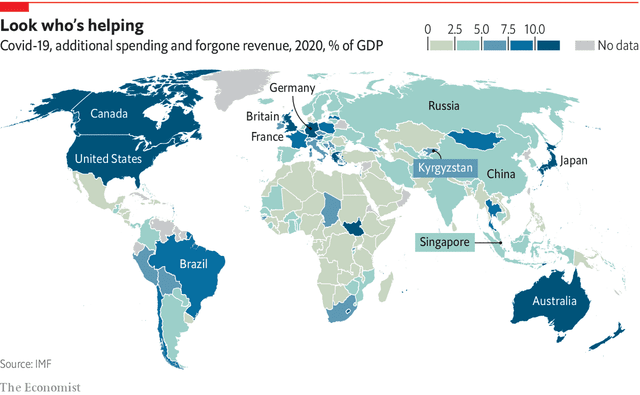The hotly contested strategy of deliberate exposure, known as a human challenge trial, could speed up the process of identifying effective coronavirus vaccines.
LONDON — Scientists at Imperial College London plan to deliberately infect volunteers with the coronavirus early next year, launching the world’s first effort to study how vaccinated people respond to being intentionally exposed to the virus and opening up a new, uncertain path to identifying an effective vaccine.
The hotly contested strategy, known as a human challenge trial, could potentially shave crucial time in the race to winnow a number of vaccine candidates. Rather than conducting the sort of trials now underway around the world, in which scientists wait for vaccinated people to encounter the virus in their homes and communities, researchers would purposely infect them in a hospital isolation unit.
Scientists have used this method for decades to test vaccines for typhoid, cholera and other diseases, even asking volunteers in the case of malaria to expose their arms to boxes full of mosquitoes to be bitten and infected. But whereas the infected could be cured of those diseases, Covid-19 has few widely used treatments and no known cure, putting the scientists in charge of Britain’s study in largely uncharted ethical territory.
Starting with tiny doses, the scientists will first administer the virus to small groups of volunteers who have not been vaccinated at all, in order to determine the lowest dose of the virus that will reliably infect them. That process, scheduled to begin in January at a hospital in north London, will be followed by tests in which volunteers are given a vaccine and then intentionally exposed to this carefully calibrated dose of the virus.
The study will be led by scientists with Imperial College London and hVivo, a company specializing in human challenge trials. It still requires approval from Britain’s drug regulation agency, but the government said on Tuesday that it would allot 34 million pounds, or $44 million, in public funding.
The first round of volunteers, up to 90 healthy adults aged 18 to 30, will have the virus dripped into their noses without having been vaccinated. If not enough participants become infected, the scientists will try to expose these early-stage volunteers to a higher dose, repeating the process until they have identified the necessary exposure level of the virus.
Only once the scientists decide on a dose, which they intend to do by late spring, will they begin the process of comparing vaccine candidates by immunizing the next group of volunteers and then exposing them to the virus.
Some vaccine candidates now undergoing trials may already have received approval by then, but researchers hope a challenge trial will add direct evidence of efficacy and help them compare the performance of different vaccines.
“Deliberately infecting volunteers with a known human pathogen is never undertaken lightly,” said Professor Peter Openshaw, an immunologist and co-investigator on the study. “However, such studies are enormously informative about a disease, even one so well studied as Covid-19.”
Many important questions about the study remain unanswered. The British government’s vaccine task force, which will select the first vaccine candidates to include in the human challenge trial, has not yet announced its plans.
The idea of human challenge trials has already been met with a lukewarm reception by several leading vaccine makers, including Johnson & Johnson and Moderna, leaving analysts uncertain as to which companies’ vaccines will end up being included.
And it is not yet clear how regulators in Europe or the United States will evaluate results from human challenge trials, or whether such studies will accelerate the vaccine approval process.
For proponents of the strategy, saving lives by potentially speeding the development of a vaccine and advancing the understanding of the virus is a moral imperative. Those scientists and bioethicists say that the risk of the coronavirus seriously sickening or killing young, healthy volunteers — the sort of people who would be infected — is low enough as to be outweighed by the possibility of saving tens of thousands of lives.

Pedestrians in Paris on Saturday. As virus cases surge again in Europe, challenge trial advocates say the risks are outweighed by the potential of having an effective vaccine sooner. Dmitry Kostyukov for The New York Times
“I’m surprised they haven’t been used earlier,” Professor Julian Savulescu, the director of the Oxford Uehiro Center for Practical Ethics, said of human challenge trials on coronavirus vaccines. “Every day that you delay developing a vaccine and effective treatment, another 5,000 people die. It’d be useful for screening out less effective vaccines and for understanding the immune response.”
Skeptics have urged scientists to wait, or to forgo the approach entirely. There have been unexpected and unexplained cases of severe illness in young patients, and the long-term consequences of an infection are unknown, with the pandemic having started only months ago. It is also difficult to extrapolate widely from a human challenge trial. It is unclear, for example, whether studies in healthy young adults could reliably predict the efficacy of a vaccine in older adults or people with pre-existing conditions.
Scientists have also warned about the challenges of mimicking real-world transmission in a laboratory. That could make it difficult for the researchers to know whether a vaccine that may protect volunteers from deliberate exposure in a hospital would do the same for people encountering the virus at work or at home.
“Is it breathed out, sneezed out, do you sniff it all in one fell chunk of virus coming at you?” said John Moore, a professor of microbiology and immunology at Weill Cornell Medical College. “No one really knows. It’s so hard to model. Squirting a bolus of virus into the nose is an imperfect model of natural transmission.”
The debate has split an advisory panel to the World Health Organization, which published guidelines about the safest way to conduct challenge trials in June. In the United States, the National Institutes of Health said that it was not planning to support such trials and that randomized clinical trials were sufficient.
But Britain took a different view.
Prime Minister Boris Johnson, facing a barrage of criticism for his handling of a pandemic that has left Britain with the highest death toll in Europe, has tried to cast the country as being at the forefront of scientific progress on the coronavirus. Researchers at the University of Oxford have developed one of the leading vaccine candidates, as well as one of the most promising treatments, the steroid called dexamethasone.

Prime Minister Boris Johnson has faced a barrage of criticism for his handling of a pandemic that has left Britain with Europe’s highest death toll. Pool photo by Leon Neal
Some scientists questioned whether the fierce competition to be the first to develop an effective vaccine had unduly influenced plans for a human challenge trial.
“There’s unquestionably vaccine nationalism involved,” Prof. Moore said. “It’s a race for money and glory. That’s the reality of it.”
The scientists overseeing the trial said they would use the antiviral medicine remdesivir to treat volunteers as soon as they began detecting viral infection, even before the onset of symptoms. But that drug has been found to have only modest benefit. And some analysts said the treatment, while necessary, would limit researchers’ ability to determine whether the vaccine candidates being evaluated reduced the severity of illness.
The volunteers in London will be paid roughly Britain’s minimum wage, which is about £9, or $11, per hour, for their time in taking part in the trial and their two to three weeks in mandatory quarantine. The researchers said they were wary of offering additional incentives that could cloud the judgment of volunteers.
Thousands of people in Britain have already expressed interest in taking part in challenge trials for the coronavirus through an American group, 1Day Sooner, that advocates for such studies.
But with the virus now surging again across Europe and parts of the United States, some scientists have argued there is no shortage of people enrolled in ordinary vaccine trials being exposed to the virus under natural conditions.
“This is not a rare disease,” said Dr. Paul Offit, a professor at the University of Pennsylvania and a member of the Food and Drug Administration’s vaccine advisory panel. “You can probably find a hot spot to do a vaccine trial.”
FEATURED IMAGE: Brick Lane Market in East London on Sunday. Prime Minister Boris Johnson has tried to cast Britain as being at the forefront of scientific progress on the coronavirus. Andrew Testa for The New York Times
By Benjamin Mueller/The New York Times







